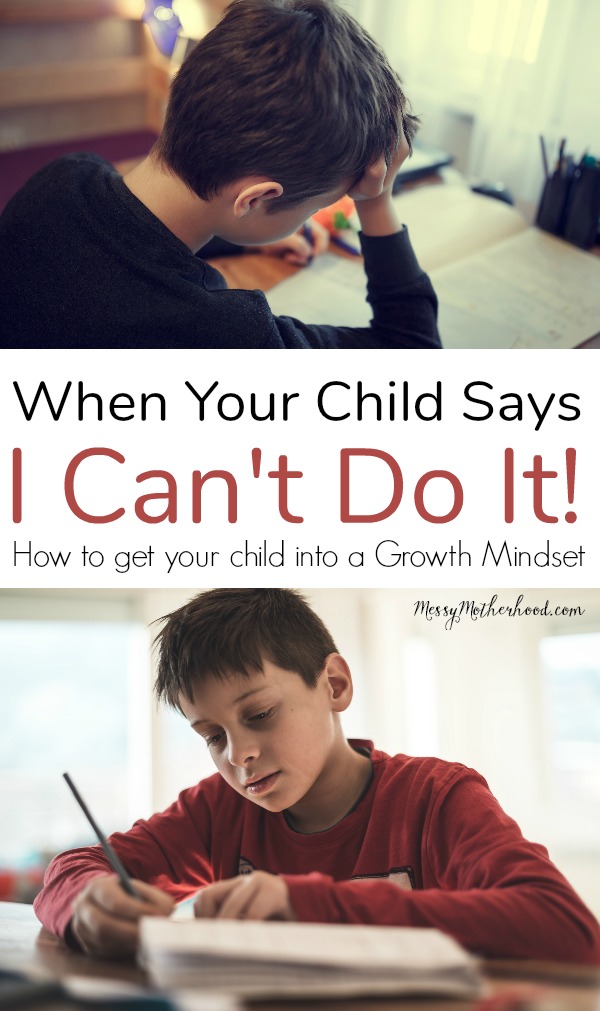Inside: Learn why encouraging a growth mindset in kids is so important and how one simple change can get your child from “I can’t” to “I can!” This post contains affiliate links.
My eldest daughter is extremely bright and has an incredible memory, which has served her well as a student.
She knew her coins and values before she was 2 years old.
She had her ABCs and sounds memorized, read well before Kindergarten, and devoured chapter books by 1st grade.
She knew her addition and subtraction facts and could spell any word she saw once.
You could show her once and she knew how to do it, so she never had to study.
She never really had to work hard to learn anything.
And everything came easily to her.
Until one day, it didn’t, and it was the end of the world for her.

Since she never came across a problem that was tricky for her, my daughter never knew what it felt like to not know the answer right away.
All of this “easy success” led her to have a fixed mindset about her learning and “I can’t” and “I don’t know how” became her new mantra.
Because she didn’t have a growth mindset, she was stuck. And frustrated.
And so were we.
Why should we encourage a growth mindset in kids?
Since everything had come easily to my daughter in school, she never had to problem solve. Academically, she never had to face something she couldn’t do.
And so in her fixed mindset, that was it…she wasn’t going to be good at third-grade math because she didn’t already know how to do it.
Two-step multiplication problems were her downfall. She simply threw her hands in the air and gave up with a boatload of “I can’ts” as she quit before she ever really started.
What she needed was a growth mindset.

A growth mindset is the belief that anything can be learned and improved on, if you work at it.
Her fixed mindset had her focused on the outcome only: whether she could do the problem or not.
But a growth mindset would focus her attention on the effort she put in to learn a new skill or try a problem different ways until she figured it out.
It would allow her to not know something but still find success at it if she worked hard.
So why is a growth mindset in kids so important?
Listen, not everything is going to be rainbows and unicorns in life.
Not everything will come easily to us or our kids.
When kids face a new problem, they can choose one of two ways to respond.
If they come to a problem or roadblock or obstacle and say to themselves, “Oh well. I can’t do it because of x, y and z so I shouldn’t even try,” we won’t get very far in life.
They won’t meet their potential.
If a child sees a problem as an opportunity to try something new, they say to themselves, “Well, I don’t know how to do it yet, but I’m going to figure it out. I’m going to keep trying until I get it.”
This opens up a myriad of opportunities for them in life and provides them with limitless options.
I choose option B for my kids because I want them to want to try new things.
I want them to see their failures or inability to do something as a temporary set back or as a stepping stone to get better.
And I want them to be lifelong learners who are willing to overcome obstacles, not just stare at them and say, “Oh well. I can’t do it.”
So how do you encourage a growth mindset in kids?
But really, it starts with how I talk to my daughter.
The way we talk encourages a growth mindset in kids:
I thought I was doing everything right. I was praising her spelling skills and her reading skills and her math skills. I encouraged her to keep reading, to keep writing, and to keep counting those coins.
But I was praising the wrong thing.
I was focused on the outcome, not her effort.
I never once told her I loved how hard she worked on her math problems.
I never praised her work ethic or told her I was proud of her for solving problems when they felt “too hard.”
And so I missed the mark.
I unwittingly set my daughter up for disappointment and frustration when she couldn’t do a new problem or a new skill.
So we had to back up. We had to teach her how to have a growth mindset.
So we had to:
- change what we say to her and how we say it,
- build her up with phrases that encourage a growth mindset,
- let her know it’s okay to not know how to do something, and
- let her know we value the skills of figuring out the answer more than her already knowing the answer.
Get More Tips Here –> Check out these amazing Growth Mindset Tools
So we now praise effort rather than the outcome.
We praise her ability to try new ways to solve the problem, even if those ways don’t result in a “success” or a positive outcome.
And even when she is successful in solving the problem, we focus on her willingness to attack the problem, rather than her success when she got the problem right.
A go-to “praise phrase” in our house is now: “You worked hard on that! You should be proud of yourself.”
Because here’s the deal, life isn’t going to be easy all the time.
Our kids need to know they can have a problem and work their way through it.
And if they struggle now when the stakes are low, they will gain the confidence they need to work through tough problems and “survive” it.
Because I want my kids to be up for the challenges that life throws their way, whether it be calculus, learning how to ride a bike, or figuring out two-step math problems in the third grade.
And I want kids who say to themselves, “Okay. This is a problem. I don’t know how to do it. Yet.
But I know I can figure it out.
I am a problem solver.
I got this.”
More for you:

Thank you so much for this useful article!
Great article!